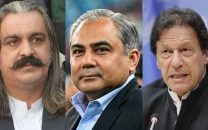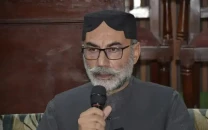High courts chalk steps to safeguard independence
LHC full court meeting to deliberate on SC’s April 3 order

In a bid to safeguard independence of the judiciary from undue interference, various high courts across the country have initiated deliberations aimed at formulating proposals to address concerns regarding meddling in the judicial functions by agencies.
Lahore High Court (LHC) Chief Justice Malik Shehzad Ahmed Khan has called for a full court meeting scheduled for Monday to deliberate on the Supreme Court's April 3 order in a suo motu case on a letter from six Islamabad High Court (IHC) judges.
The LHC judges will discuss and "consider how best to protect the independence of the judiciary" and to "put in place a mechanism to affix liability for those who undermine such independence and clarity for the benefit of individual judges the course they must take when they find themselves at the receiving end of interference and/or intimidation by members of the executive", in the light of directions of the SC passed in sou motu case.
All the judges gracing at principal seat have been requested to make it convenient to attend the meeting. The judges working at the three benches as per respective rosters will participate in the meeting through video-link.
It has been revealed that IHC CJ Aamer Farooq has requested proposals from all high court judges individually by Monday.
Following the submission of these proposals, a decision will be made regarding the convening of a full court meeting.
Similarly, two judges from Islamabad sessions courts have been tasked with providing proposals on the same subject. Copies of the order have been distributed to the relevant judges for their consideration.
Furthermore, Sindh High Court Chief Justice Aqeel Abbasi may also call for a full court meeting on this matter in the near future.
In pursuant to the April 3 order, all high courts and other relevant stakeholders are supposed to submit their proposals by April 25.
Lawyer Abdul Moiz Jaferii stated that it is a welcome step, which contributes to fostering consensus within the judiciary, as originally sought by the letter from the IHC judges. "It will help if this is repeated in every other high court; and if judges are allowed to speak their mind on their own experiences of interference by the executive,” he added.
This, he reckoned, will also go towards establishing the extent of interference and also to create a deterrent against such pressure.
Two leading legal bodies, namely the Pakistan Bar Council (PBC) and the Supreme Court Bar Association (SCBA), have also been requested to submit their proposals. The majority of representatives in both organisations belong to the Independent Group, which is known to be aligned with the government.
One representative of the bar stated that, in principle, the bar opposes interference by agencies in judicial functions. However, he believes that a commission comprising serving judges is necessary to identify individuals who attempted to manipulate judicial proceedings.
Nonetheless, both bars stand in solidarity with CJP Qazi Faez Isa in all matters, he asserted.
Meanwhile, former prime minister Imran Khan has decided to send a letter to Chief Justice Qazi Faez Isa. In the letter, he will urge the chief justice not to preside over cases related to him and the PTI in light of the recent order from the larger bench.
Imran will also raise objections to any potential government efforts to extend CJP Isa's tenure through constitutional amendments.



















COMMENTS
Comments are moderated and generally will be posted if they are on-topic and not abusive.
For more information, please see our Comments FAQ